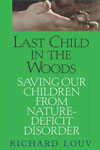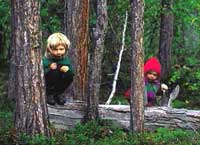
Vol. IV, No. 5, August/September 2005
- How young children perceive symbols in their environment
- The Children's Environmental Health Network
- The bigger the serving, the more children eat
- Childcare facilities' national loan resource update
- Richard Louv's Last Child in the Woods: Saving Our Children from Nature-Deficit Disorder
- Kresge Foundation funds 'green' childcare buildings
- Free classroom acoustic standards available
- 2006 Early Childhood Facilities Design Institute schedule
- Recent professional development
- Current projects
Richard Louv's Last Child in the Woods: Saving Our Children from Nature-Deficit Disorder
 "I
like to play indoors better 'cause that's where all the electrical
outlets are," reports a fourth grader. But it's not only computers,
television, and video games that are keeping kids inside. It's also
their parents' fears of traffic, strangers, Lyme disease, and West
Nile virus; their schools' emphasis on more and more homework; their
structured schedules; and their lack of access to natural areas. Local
governments, neighborhood associations, and even organizations devoted
to the outdoors are placing legal and regulatory constraints on many wild
spaces, sometimes actually making natural play a crime.
"I
like to play indoors better 'cause that's where all the electrical
outlets are," reports a fourth grader. But it's not only computers,
television, and video games that are keeping kids inside. It's also
their parents' fears of traffic, strangers, Lyme disease, and West
Nile virus; their schools' emphasis on more and more homework; their
structured schedules; and their lack of access to natural areas. Local
governments, neighborhood associations, and even organizations devoted
to the outdoors are placing legal and regulatory constraints on many wild
spaces, sometimes actually making natural play a crime.
As children's connections to nature diminish and the social, psychological,
and spiritual implications become apparent, new research shows that nature
can offer powerful therapy for such maladies as depression, obesity, and
attention deficit disorder. Environment-based education dramatically improves
standardized test scores and grade-point averages and develops skills
in problem solving, critical thinking, and decision making. Anecdotal
evidence strongly suggests that childhood experiences in nature stimulate
creativity.
 In
his book, Last
Child in the Woods, author Richard Louv talks with parents, children,
teachers, scientists, religious leaders, child-development researchers,
and environmentalists who recognize the threat and offer solutions. Louv
shows us an alternative future, one in which parents help their kids experience
the natural world more deeply - and find the joy of family connectedness
in the process. Most importantly, this book offers positive case studies
that support the concepts presented by the author. We highly recommend
this book for all early childhood and school teachers, education professionals
and parents.
In
his book, Last
Child in the Woods, author Richard Louv talks with parents, children,
teachers, scientists, religious leaders, child-development researchers,
and environmentalists who recognize the threat and offer solutions. Louv
shows us an alternative future, one in which parents help their kids experience
the natural world more deeply - and find the joy of family connectedness
in the process. Most importantly, this book offers positive case studies
that support the concepts presented by the author. We highly recommend
this book for all early childhood and school teachers, education professionals
and parents.
White Hutchinson was recognized by Louv in his book for the help our company offers childcare, school and leisure facilities interested in designing outdoor children's play spaces: discovery play gardens. Louv quoted one of our articles in his book:
"There is a sense of wildness about a discovery play garden. Children's discovery play gardens are very different than landscaped areas designed by adults, many of whom prefer manicured lawns and tidy, neat, orderly, uncluttered landscapes. Discovery play gardens are much looser in design because children value unmanicured places and the adventure and mystery of hiding places and wild, spacious, uneven areas broken by clusters of plants."
Additional reading:
- Article cited by Louv: Children's Outdoor Play & Learning Environments, Returning to Nature
- Creating Playgrounds Kids Love
- Young Children's Relationship with Nature: Its Importance to Children's Development & the Earth's Future
Vol. IV, No. 5, August/September 2005
- How young children perceive symbols in their environment
- The Children's Environmental Health Network
- The bigger the serving, the more children eat
- Childcare facilities' national loan resource update
- Richard Louv's Last Child in the Woods: Saving Our Children from Nature-Deficit Disorder
- Kresge Foundation funds 'green' childcare buildings
- Free classroom acoustic standards available
- 2006 Early Childhood Facilities Design Institute schedule
- Recent professional development
- Current projects

